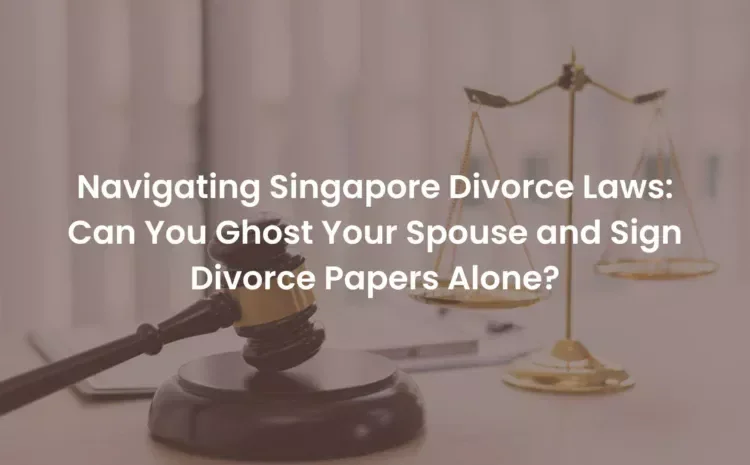Navigating Singapore Divorce Laws: Can You Ghost Your Spouse and Sign Divorce Papers Alone?
Divorce is a difficult and often emotionally charged process, and it’s natural to seek the path of least resistance. In today’s digital age, the concept of “ghosting” extends beyond the realm of interpersonal relationships and into the legal arena. But can you really ghost your spouse and sign divorce papers on your own in Singapore? Let’s delve into this complex question within the framework of Singaporean divorce laws.
Understanding the Basics of Divorce in Singapore
In Singapore, divorce falls under the jurisdiction of the Women’s Charter. According to the law, there is only one ground for divorce: the irretrievable breakdown of the marriage. This can be proven through one or more of the following five facts:
Adultery: One spouse has committed adultery, and the other finds it intolerable to live with them.
Unreasonable Behavior: The behavior of one spouse is such that the other cannot reasonably be expected to live with them.
Desertion: One spouse has deserted the other for a continuous period of at least two years immediately preceding the filing of the divorce.
Separation: The spouses have lived apart for a continuous period of at least three years immediately preceding the filing of the divorce, and both parties consent to the divorce.
Separation with Contest: The spouses have lived apart for a continuous period of at least four years immediately preceding the filing of the divorce.
The Ghosting Conundrum: Can You Divorce Without Your Spouse’s Involvement?
Now, let’s address the crux of the matter: ghosting your spouse and signing divorce papers solo. In Singapore, divorce is a legal process that requires active participation from both parties, albeit to varying degrees depending on the circumstances.
Uncontested Divorce:
If both spouses agree to the divorce and are able to settle all ancillary matters, such as custody of children, division of matrimonial assets, and maintenance, then an uncontested divorce may be pursued. In this scenario, it is possible for one party to take the lead in initiating the divorce proceedings and preparing the necessary paperwork with the assistance of a lawyer. However, the other party must still be informed and consent to the divorce.
Contested Divorce:
If one spouse refuses to consent to the divorce or disputes any of the terms, then the divorce is considered contested. In such cases, ghosting your spouse and attempting to proceed with the divorce unilaterally is not only ethically questionable but also legally untenable. The court requires both parties to be properly served with the divorce papers and affords them the opportunity to respond and present their case.
The Importance of Legal Counsel and Due Process
Regardless of whether your divorce is uncontested or contested, seeking legal counsel is essential to navigate the complexities of Singaporean divorce laws. A qualified family lawyer can provide invaluable guidance, ensure that your rights are protected, and help facilitate a smoother and more amicable resolution, where possible.
Moreover, it’s crucial to adhere to due process and uphold the principles of fairness and transparency throughout the divorce proceedings. Attempting to circumvent the legal requirements by ghosting your spouse not only undermines the integrity of the process but can also lead to protracted legal battles and unnecessary acrimony.
Conclusion
In conclusion, while the notion of ghosting your spouse and signing divorce papers on your own may seem appealing in theory, it is neither practical nor permissible under Singaporean divorce laws. Divorce is a serious legal matter that requires careful consideration, communication, and adherence to due process.
Whether your divorce is uncontested or contested, it’s imperative to approach the process with honesty, integrity, and respect for the legal framework. By seeking legal counsel and engaging in constructive dialogue with your spouse, you can navigate the complexities of divorce with greater clarity and compassion, ultimately paving the way for a smoother transition to the next chapter of your lives.
Contact our lawyers at 8780-2499 to learn more.

